Happily ensconced in skype, I didn’t hear anything until my roommate knocked on my closed bedroom door. I looked up, distracted by my friend talking on the other side of the world.
“the guard has caught someone and he’s holding him in the yard.”
I smiled and nodded at her. I’m unsure why. It wasn’t even a masking kind of smile. I felt no fear. I lingered for a moment longer talking and then, seeing the look on her face still standing in my doorway, I said goodbye and followed her out.
Sure enough, the guard had a man by the scruff of his shirt and kind of wagged him back and forth as he spoke unintelligibly to us. I’m always lost in language here, spending most of my working time dealing in English (and my non-working time ignoring the mzungu chant from little people), but my roommate is pretty good with lusoga. But she was lost too.
“that isn’t lusoga. Maybe Swahili?” she guessed.
Still our guard was excited. My roomie called P, one of our colleagues; the same colleague I’d just had an in-depth discussion with about getting rid of our daytime guard. His face had looked very concerned and he shook his head knowingly, “people see mzungus and believe certain things. They believe you have money. And it is the season, Christmas, it isn’t safe for you not to have guards.”
He was adamant, and not being from around here, I tend to err on the side of local knowledge. So I handed over this month’s payment and went about the business of feeling safer here than most places.
And then there I was staring into the face of a man who our guard caught, apparently smoking a cigarette, and peering through our living room window. Forced to sit legs tangled close to his body or splayed out uncomfortably, first on the steps between the office and house, and later on our front porch, the intruder didn’t say much. He kept fiddling with a leaf filled with dirt or moss or something. We guessed traditional medicine but had no way to verify or any means of understanding why he had it.
Distilled from all of the things the intruder offered up as reasoning for his presence in our compound, unannounced at 9pm – visiting a friend, looking for a job – one truth was that he used to work for our security company. Not a particularly warm and fuzzy feeling.
Still, he sat, docile, eyes occasionally meeting mine as if he expected me to understand something; head sometimes cradled in his hands after the crisp sound of hand to flesh from our overzealous guard.
He was carried away to the police station. I never really heard him protest and despite promising to fill in the details, I still don’t know why he was here or what is to come of him.
I can hear my mother muttering under her breath from here…but at least there wasn’t gunshot like when I lived on MLK. As my dad always says in answer to my sometimes interesting living situations, “the same God that takes care of her here takes care of her there”…wherever there happens to be.
Tags: crazystuff, travel, uganda
Kamuli Mission Hospital, Uganda
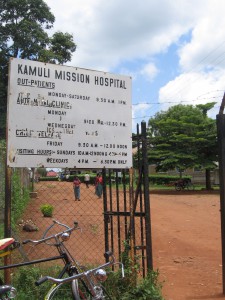 The morning was cool. clouds coated the sky in patches, the sun still shining through as the women emerged a few at a time from inside the health center. Some smiled shyly, extending a hand, sometimes two to clasp mine in greeting. Others extended hands without the smile. Eyes shadowed – maybe by the magnitude of the weeks ahead.
The morning was cool. clouds coated the sky in patches, the sun still shining through as the women emerged a few at a time from inside the health center. Some smiled shyly, extending a hand, sometimes two to clasp mine in greeting. Others extended hands without the smile. Eyes shadowed – maybe by the magnitude of the weeks ahead.
On the bus, I chatted with the nurse and our field office. Conversations meandered randomly managing cats and politics among other things. Our conversations finally fading, the prevailing silence of the women seated in pairs behind us, announced itself. Jewels spoke rapidly in Lusoga and a faint melody answered him. Halting. Unsure. It fell to silence.
A few moments later the melody struggled again against the silence and lost itself in the wind blowing steady through open windows. A final attempt, and success, voices mingled together sweetening the rumbling of the coaster’s tires over the dirt road.
Jewels lean forward casually, “it was too quiet, they are worried. They must make noise.”
Somehow I had missed the gravity of this ride. Didn’t give it the proper reverence. Glossed over what must have been an ominous feeling of what was coming, what to expect. Would it hurt? Would it be successful?
This wasn’t just transportation. This was transportation to possible life-changing surgery.
Easing to a stop on the side of the road, a woman clambered out of the miniature bus to use the toilet. Waiting absently for her to return, the air still, it was the first time I’d caught the lingering scent of urine that is the constant companion to women with obstetric fistula. A reminder, like their default silence, that complicated surgery lay ahead to repair the holes (fistula) that develop between either the rectum and vagina or between the bladder and vagina usually as the result of unattended obstructed labor. It is a condition mostly of the poor, highly uncommon in the western world.
These 11 women (joining others from all over Uganda) and their caretakers for the next two weeks, anticipated, feared, wondered, hoped… what surgery would be like, how life might change. for those attending the fistula repair camp for the first time, maybe it was fear of pain that left them subdued. For those on a second round of surgery, maybe the fear that they would not find success and hope, revealing itself a charlatan, would return them to their mothers’ homes, or the outskirts of villages where communities’ fears of bewitching perpetuate stigma and shame.
Twenty-three years suffering or eight months, the busload of women sharedthis long bus ride across a dirt road, the slight scent of old urine as constant companion, and the hope that glows at the end of a scalpel, stitches, and time to heal.
“I haven’t even been proposed to here, I think I’m insulted.”
I was half joking but in retrospect I can hear how it must have sounded. No knowledge of my constant proposals in South Africa, no context for “love at first sight” in Liberia, it must have sounded absurd.
James, a twenty something UNDP intern, immediately replied, “you aren’t up to standard here.”
Cool kisses from the wind against my face soothed a little but the sting of his words still clung loosely to me as the boda wove its way through kampala, chasing James and catching my humility instead.
His words all the more glaring in the wake of an earlier comment from one of the university students at our dinner table, “when are you getting married?” he inquired.
“I don’t know.”
“you must invite me to the wedding,” he insisted.
“why?”
“because you are a vigorous woman,” he supplied, as if that explained it all.
Vigorous? Vigorously not up to standard. and it is a silly little vanity. A joke that lingers because it cuts closer to home than anyone realized, I like to believe closer than anyone intended. But beauty is relative and apparently I am no kissing cousin.
I wanted it to be worthy of him. As if anything would have been worthy of him. As if anything could say to the world, this was my friend. Magnificent. Brilliant. Generous.
I wanted it to be worthy of him and found myself angered when the cell phones rang during the service, when the camera spotlight glared in my face, when the pastor proselytized a faith shoes didn’t believe in to his family that did not practice it.
And where the funeral could never have been worthy, there were so many parts, taken in isolation…taken in context…taken in the spirit shoes would have taken them…that were.
B standing alone and comfortable in the pulpit, leaning his 6’4 frame slightly to the left, gently unfolding his friendship with shoes into tangible terms we could all grasp. His numerous accomplishments. Anecdotes highlighting his kindness, his dedication, his human-ness. In the moments when B’s soft voice shared the interiors of their friendship I could see my friend beyond the wooden box that crowded the center aisle.
Shoe’s parents gifting the offering taken on their behalf back to the church was worthy. His parents donating his body to science. His mother flitting between reception tables spooning out extra food to attendants. Comforting those of us unable to hold back the sadness. Those things were all worthy.
my initial rage was eventually quelled when I, laughing with shoes’ friends – now mine, realized he would have been laughing… probably was. When I realized that the tribute to shoes was in all of us gathered, in all of us determined to remember his work and bring it forward.
At the hospital, after lying beside him and softly singing to her son as he died, seetha came out to comfort his friends and told them, “now you are his hands.” The work that he would have done – and there is so much work he was doing – we must now take up and do.
Shoes’ casket was wheeled down the aisle to the steps that look out over kampala. People milled past the open casket, sometimes eye averted other times eyes glued to the small battered body that was our friend.
But more than the remains of him, or even the smiling face on the framed photo set atop his casket, I like to think of shoes in the fleeting moment when his casket was closed and his mother spoke softly and kissed where his head rested below, his father standing close by. No service, no speech, was more worthy than that.
Tags: friends, observations, uganda
She lay there. Still. Mechanical breath raising and lowering her chest with a slight pause – a stutter in the system. The monitors flashed green and red, moaned indecipherably, whirs and screeches that – unmet by rushing attendants – were usual sounds. T’s head bandaged tightly at the crown, odd pinkish coloring against her soft brown face swelling beneath. Scratched chin scabbed but healing.
Diagonal to her walled cubicle, angled so that only his blanketed legs were visible, he lay battered and broken.
His head, bandaged in white. Instead of a uniform ring, incongruent strips stretched haphazardly, clinging delicately to the places where Shoe’s skull had been. His face swollen beyond recognition. His usually bright eyes lost behind square patches of gauze.
At once the certainty that he’d soon be countering me in some public health debate was lost like a precious ring slipped from a long finger and settled, unnoticed, on a murky lake bottom.
I wiped my nose, snot leaking warm and mingling with stunned tears. I had expected bad, but tv bad, bad where everyone goes home at the end of the hour.
Returned to the waiting room, Randee hugged my neck – a gesture of shared loss that broke the insufficient emotional dam I’d been holding onto. I sat on the waiting room bench, hard and wooden, and juxtaposed Shoes’ and T’s emotionless faces against memories of their healthy laughter.
Around me, Shoes’ dad, T’s boyfriend, moved about sharing a joke with Davis and Meri – friends on the other boda that fateful Friday night. Friends that came upon the broken bodies of our friends flung from the boda by a hit and run driver. Friends that moved them from asphalt to ambulance, questionable Mulago hospital to reputed IHK.
Day four of their attentive vigil, they were all dry eyed. I was the traitor to the collective serenity. The relative improvement of T invisible to my newly seeing eyes. BLB arrived a few moments later, another welcome hug against the sadness and sense of helplessness and foreboding. Moments passed, and I regained my composure, offered a smile instead of tears.
For T, despite machine’s breath and nature’s swelling, the prognosis is good. The expectation is consciousness in the next few days. Already weaned from the morphine meant to keep the pain at bay, her family waits patiently for alert and recognizing eyes, for stability that can survive the flight to India and recovery there.
But Shoes…
his beautiful and gracious father emphatically shared his appreciation at our presence, the pleasure of seeing so many people touched by his son to gather in the small room- the covered patio outside- to sit in vigil with him as he waited for his wife and a miracle to arrive.
Shoe’s mother arrived, but the miracle joined that ring on the murky lake bottom. Early Wednesday morning B, Shoe’s roommate, whispered me awake.
“he’s fading…”
The harshest of realities, he was already gone.
I didn’t accompany B to the hospital. Substantial as Shoe’s imprint has been in my life over such a short time, my presence – my witness to his passing – felt wrong; although sitting on the couch wasn’t right either.
But then what could be right about a 25-year-old, fourth year medical student, fogarty scholar, gentleman, whiskey drinking, laughter filled, ray of sunshine losing sodium and blood pressure in a crowded ICU?
Chance introduced us and an impatient driver forced our farewell. Short time irrelevant, the memory of him etched in my memories weighed against his new absence is epic.
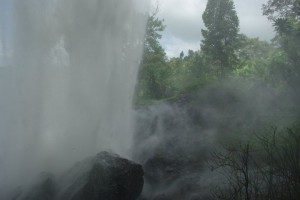 The sound, like distant thunder, vibrated in my ears. Constant. Dull. Roaring. The thin brown trail, a muddy groove tread into the lush greenery of the mountain side slipped underfoot, sucked at the bottom of my shoes, and cascaded rocks below. The view varied, sometimes obscured by banana trees and dried corn stalks, others, open to the sky and surging water ahead.
The sound, like distant thunder, vibrated in my ears. Constant. Dull. Roaring. The thin brown trail, a muddy groove tread into the lush greenery of the mountain side slipped underfoot, sucked at the bottom of my shoes, and cascaded rocks below. The view varied, sometimes obscured by banana trees and dried corn stalks, others, open to the sky and surging water ahead.
the strenuous climbing was broken, intermittently by awe. Clambering through muddy pools of water, slipping and narrowly missing a mud bath, I found myself in a cave carved out behind my first waterfall. The sound bounced off the gray walls and water crashed on the enormous rocks below, the wild splash drenching me from head to foot.
It was like prayer. The sound deafening but peaceful, the water cold but inviting. I wanted to sit. To bask. Instead I found myself trying to capture it in photos that do not reveal the beauty behind the frothing sheets of water careening down from one hundred meters above.
The guide ushered me on, two more waterfalls on the eight kilometer circuit. And so I 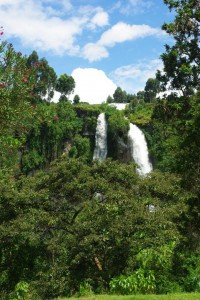 climbed.
climbed.
From the bottom of that fall to the top, I found myself peeking over the edge where the water was rippled glass before whipping itself into a frenzied freefall that moments before I watched from a completely different perspective.
Two stoic children sat on a nearby rock and stared blankly as I took photos of the water, of the panoramic view of the surrounding flatness interrupted only by the cluster of towering mountains, one of which I was perched on.
The second fall fell heavy but he fickle mist descended lightly until a shifting wind doused me completely.
The third, and largest, fall required more exertion. Trailing through the community nestled into the side of the mountain, stopping to examine coffee and sorghum drying under a blazing sun on plastic sheets and to greet, “how are you?” “I’m fine, how are you?” confused pause, “hello” from children bold enough to do more than wave.
I crossed the meandering tarred road, men drinking local brew, a woman napping in the shade. And after scrambling over rocks with narrow paths between them found myself at a ladder, perfectly vertical against a sheer wall of earth several meters down. The carpenter was full of whimsy, some of the rungs so close together my shoes grazed the previous rung, sometimes they were at jaunty angles made less jaunty given the distance to the ground, while still others forced my foot to dangle in trusted anticipation that another rung would appear.
Safely to the bottom and the trail wound steeply through slanted farmland, banana trees, sweet potatoes, and corn oblivious to the precarious perch their roots maintained. The sound of liquid thunder intensified, sprays of water created mud so thick it swallowed my shoe momentarily, inviting mud and rocks beneath my heel and at my toes. The spray misted lightly up settling like dew on the twisting vines of my hair.
I stopped. Looking up at the highest of the three falls in awe. But the guide continued, wending his way to a narrow strip of soggy earth that jutted decisively toward the plummeting water. Here the water was a strong hand pushing me wetly back. Waves of water washed over me continuously preventing me from stealing even a furtive glance of the majesty before me.
A few more moments of trying, I spluttered and spit and made my way back to the relative calm and dryness of my previous perch. Soaked completely, I laughed and began the slow ascent.
The guide carried my pack most of the way up. I stopped periodically to remove muddy stones cemented into the soles of me feet and to catch my balance and breath. we emerged onto that same winding tar road that snaked through sipi. The sky blue, the sun warming, the breeze drying. Our first fall lay directly ahead, seemingly silent and contained in the distance.
Iganga Town, Uganda
September 27, 2010
The power flickered. The surge protector, a metal box about three or four times the size of a box of Kleenex clicked off then on then off then on then off. I groaned.
The thing is, we’d had a conversation about buying paraffin earlier in the day. Even had a plan. But buying paraffin was replaced with buying olive oil and so we sat in the dark contemplating “what next”.
Hiring a boda seemed the best option, only we didn’t have a number for any that we know. in the absence of that, giving a random man 5000 shillings and some empty bottles didn’t bode well for having light anymore than us staring at each other and talking about buying paraffin…again.
Jokingly, teaqueen, suggested I called BLB (Big Little Brother). Silly because he lives in kampala but brilliant because he’s spent a lot of time in iganga and could probably help. “let me see what I can do,” he mumbled into the phone after an exchange of pleasantries.
I forgot about it, resigned to a dark night…neither the first nor last this rainy season. But twenty minutes later and the streaking lightening illuminated a looming figure in the door…small jerrycan in hand.
He thought I’d seen him in town, didn’t realize it was only a fluke that I’d called him at all. But thankfully, he came bearing five liters of paraffin and a readiness to laugh.
We sat around talking, joined by our field officer next door. An hour or so later santa stopped by for a late dinner. Now we all crowded in the kitchen on tiny stools, the floor, eventually plastic chairs. I chopped and fried eggplant, minced onions, garlic, ginger, and cabbage, pulling together some version of fried rice that santa would eventually douse with ketchup.
The lights flicked back on and we all wondered if the magic would disappear with the darkness. But no…
It was the best kind of evening. Random and unexpected. A gathering with no agenda but plentiful in conversation twists and food-spitting side-splitting laughter.
It was midnight when the guys trailed out. Teaqueen had retired earlier. An hour or so after her our field officer returned to her side of the house, and almost immediately after BLB and Santa readied to go.
Our guard was nowhere to be seen as I clanged the gate loudly to let them out. The sky, having cried herself exhausted, now showcased a bright slightly waning moon with only wisps of clouds as cover. The guys moved off together, trying desperately to maneuver around puddles and the dissolving dirt heaps turned mud slides dropped off at 10 foot intervals down our street a week ago in anticipation of smoothing it.
I locked the gate behind me and skipped lightly to the house, picking up and washing dirty dishes, locking doors, and turning off the lights. Laughter still rang in my ears and creased my face as I settled in for sleep.
Iganga Town, Uganda
September 25, 2010
They smiled at me through my open window, me splayed out in the bed watching a movie on my laptop. I’d just pulled my earplugs out because I…I guess I heard them coming. Our guard grinned down at me as I waved them all in the direction of the front door.
There they were, the three smiling kids that live next door. About my complexion, hair not too far off either, they always wave shyly. Moreover, they never call me mzungo. Instead they greet me in English or giggle when I greet them in lusoga.
“how can I help you?” I asked as I walked out onto my freshly mopped patio. A small pair of plastic sky blue shoes snagged my peripheral vision.
“our mother says to give us money,” the oldest, maybe 12 or 13 smiled at me as she spoke, her brother and sister peered up at me.
I tensed. Curiosity immediately transformed into the most complex and tangible anger I ever experience here. It isn’t new; and still I don’t know how to deal with it.
“I don’t have money for your mother,” I answered blandly. The kids prepared to leave, the little boy struggling with his shoes under my watchful eyes.
The feeling squeezed the pit of my stomach. The reality that I’m no part of this community, not really. Despite the LC1 coming by this morning to inform me that I am listed as the head of household for our home in anticipation of the census. Despite yesterday’s lighthearted market visit. My avocado seller, still recovering from malaria, coaxing me to dance to the wandering band of men playing traditional drums and strumming an electric guitar without the electricity to power it. Never mind the eggplant woman who helped me find the money I dropped or the tomato vendor, an old woman with the most beautiful smile lighting up her face when I spoke to her, carefully handling my purchase, biting holes in the bag for reasons I’m still unsure of.
I walked to the clothes -line to check my clothes and the guard wandered over. He smiled and gestured to a vinyl bag sitting on the back porch.
“give me.”
The feeling still gripping my stomach, “no,” I replied curtly. He walked on.
I am money. Made of money. Distributor of money. Mother of all things financial. The women at the front of the market tried to charge me an extra 500 shillings. My boda driver begged for more despite me knowing the price – invoking his son.
Back in my bed, curtains drawn, the last light filters through darkly. I absently return to my movie when I hear something hitting softly against the grass outside my window. I ignore it until I hear it again, see something land and bounce. I watch in mild disbelief as red dirt clods from the road outside sail over the glass tipped fence and land a foot from my window.
I jerk the gate open and startle the younger girl from next door. She lowers her head and walks toward her house.
The slam of our fence echoes as I return to my house. Angry…but at who…
Tags: aid, me-ness, observations, race, travel, uganda, work
Iganga Town, Uganda
September 24, 2010
I love Zimbabwean noses, think John Amos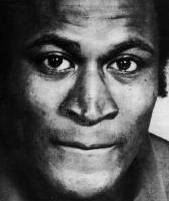
 from good times; Liberian bodies, ebony skin pulled taut and shiny over highlighted muscle. In Uganda it is the lips. Full, soft, dark. They defy comparison, only the reality that they are what lips should be.
from good times; Liberian bodies, ebony skin pulled taut and shiny over highlighted muscle. In Uganda it is the lips. Full, soft, dark. They defy comparison, only the reality that they are what lips should be.
I file these things away and weeks or countries or continents later, when I want to conjure a memory, they are like markers. The man, shirtless to the waist and boxers below leaning over to pull a bucket of water from the muddy reservoir, his lats pronounced against the green backdrop of trees and shrubs. Immediately I am on the Ganta highway crammed into the Pehbe hospital bus, Charles Taylor’s house whizzing by on my left, huge bags of coal for sale to my right.
The other day someone asked if South African men are beautiful. And oddly I found it an absurd question. Absurd despite having answered a variation of that question for myself every time I travel.
I stuttered. Stuttered and stopped. “Xhosa women are beautiful.”
I was thinking of shaka’s girlfriend so many years ago – still one of the most beautiful women I’ve ever seen. But she is one. An outlier of beauty no matter where she was from. Zulu, Kpele, English – she was exquisite anywhere. Everywhere
I don’t know why the beauty question struck me as such a strange one. I’ve wondered if Senegalese women are the most beautiful in the world as I’ve been told, if Brazilian men are the most handsome.
But if I really think on it, no one has ever asked me if American mean are beautiful. Three hundred million people, how do you decide? I’ve seen it all, forgetably average, oddly attractive in some disjointed way, a mother’s-only beautiful. There are as many representations in loveliness, who would be so limited to think there is homogeny in the face of America…hell, even in the definition of beauty?
Parts of West Africa find wrinkled necks and gapped front teeth signs of radiance. Watching western television and stick thin and blonde seems to prevail.
I wonder if the ease of asking about a people’s collective beauty is more telling about those of asking…the idea that a group can be summed up in a definition of its parts. Or it could easily be that the world is simply obsessed with beauty. That we understanding that there is a power in having it, harnessing it.
I still associate a strong sexy manly nose to Zimbabweans, bodies meant to be immortalized in shiny black marble in Liberians, and lips I want to kiss in Ugandans. But beauty, like my addresses, is inconstant and I find it everywhere.
by 11am i had been taken advantage of…twice…and was starving and tired. the ride into kampala, which in waiting terms began before 8am, was relatively quick. of course it would have helped if i had printed the conference information. instead i managed a tour of parts of the city i’d never seen, walked through makerere university’s campus, and amused the guards at the kabira country club as my boda driver inspected my 20,000shilling note to make sure it was real in the shadow of the posh establishment.
today was all about science. at least it was supposed to be. UVP successfully submitted four abstracts to this annual conference and i am responsible for presenting two – one today and one tomorrow.
our presentations centered around projects and work we do in iganga district – village health teams and our summer internship. other presentations had “sexier” topics. the seeming hit of the day was titled, speaking in tongues, could it be hysteria. it noted the history of glossolalia and hysteria, my favorite being the idea that hysteria was caused by a uterus roaming to other parts of the body.
questions abounded but Shoes refused even to clap based on scientific principle.
the day dragged to an end without even the lure of african tea to entice us to linger. so off we rode, one boda between us. Shoes squeezed in the middle to accommodate my bulging backpack and my skirt blowing in the artificial breeze.
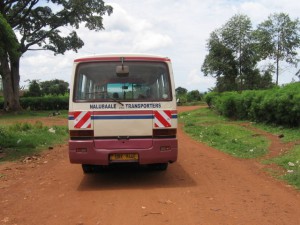
Recent Comments